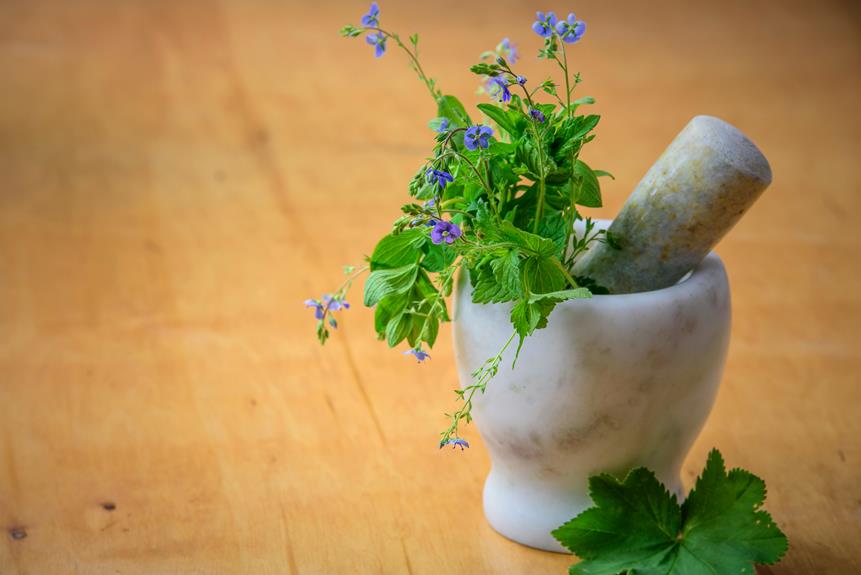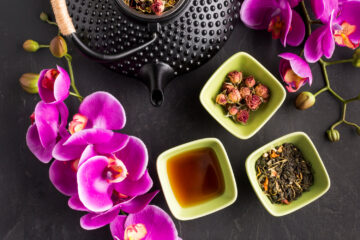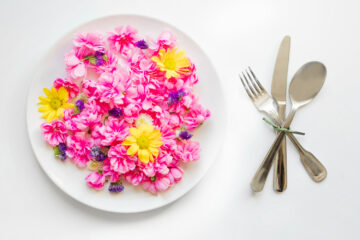Discover the transformative power of medicinal flowers like chamomile, lavender, and echinacea in "Blossoms of Healing: The Ultimate Guide to Medicinal Flowers." You'll learn how ancient cultures harnessed these natural remedies and explore their applications in both traditional and modern medicine. Rich in bioactive compounds, these flowers offer solutions for stress, sleep disorders, and skin conditions. You'll also uncover tips for growing your own medicinal garden and ensuring safe usage. This guide's rich history and practical advice will enrich your knowledge, offering you deeper insights into the world of holistic healing.
History of Medicinal Flowers
Throughout history, medicinal flowers have played an essential role in traditional healing practices across various cultures.
You'd find ancient Egyptians using blue lotus for its calming effects, while the Greeks relied on chamomile to treat fevers and insomnia.
In China, chrysanthemum tea has long been a remedy for colds and headaches.
Native American tribes used echinacea to boost the immune system and fight infections.
These flowers weren't just admired for their beauty; they were respected for their healing properties.
By understanding their historical uses, you'll appreciate how these blossoms have shaped the foundations of herbal medicine.
Their enduring legacy underscores the wisdom of ancient practices, providing a natural alternative to modern synthetic treatments.
Importance of flowers in traditional and modern medicine
Flowers have considerably impacted both traditional and modern medicine, offering natural remedies that complement synthetic drugs.
You've probably encountered chamomile tea for relaxation or lavender oil for stress relief. These are just a couple of examples where flowers play a significant role.
In traditional medicine, flowers were often used in teas, tinctures, and poultices to treat various ailments.
Modern science has validated many of these uses, incorporating flower extracts into pharmaceuticals and wellness products. For instance, the anti-inflammatory properties of calendula are harnessed in skin creams, while echinacea boosts immune function.
Understanding Medicinal Flowers
To truly grasp medicinal flowers, you need to understand their definition and unique characteristics.
You'll also want to know the various methods of preparation and how to use them effectively.
Let's explore these aspects to better appreciate their healing potential.
Definition and characteristics
Medicinal flowers, known for their therapeutic properties, offer a natural way to promote health and well-being.
You'll find these blossoms rich in bioactive compounds like flavonoids, alkaloids, and essential oils. These components work together to provide anti-inflammatory, antiseptic, and antioxidant benefits.
Each medicinal flower has unique characteristics; for example, calendula is famous for its skin-healing abilities, while chamomile is celebrated for its calming effects.
You can identify medicinal flowers by their vibrant colors and distinctive scents, which often indicate their healing properties. Understanding these characteristics helps you select the right flower for your needs.
Methods of preparation and use
Harnessing the healing power of medicinal flowers involves various preparation methods that maximize their therapeutic benefits.
You can create floral teas by steeping dried petals in hot water, extracting their essence.
For topical applications, try making an infused oil by soaking flowers in a carrier oil, like olive or almond, for several weeks.
Tinctures offer another potent option; you'll soak the flowers in alcohol or vinegar, concentrating their properties.
Salves, made by combining infused oils with beeswax, provide soothing relief for skin ailments.
Additionally, you can use the flowers to make poultices by crushing them into a paste and applying directly to the skin.
Each method allows you to utilize medicinal flowers effectively, enhancing your natural wellness routine.
Top 10 Medicinal Flower
You'll be amazed at how many common flowers have powerful medicinal properties.
Let's explore the benefits of Chamomile, Lavender, Echinacea, Calendula, and St. John's Wort.
These flowers can boost your health in ways you mightn't expect.
Chamomile
Chamomile, one of the top medicinal flowers, is renowned for its calming properties and versatile therapeutic uses.
When you're feeling stressed, a cup of chamomile tea can work wonders to soothe your nerves. This fragrant flower is also an excellent remedy for insomnia; its mild sedative effects help you drift off to sleep naturally.
Got a stomach ache? Chamomile's anti-inflammatory and antispasmodic properties can ease digestive discomfort.
You can also apply chamomile topically to treat minor skin irritations, thanks to its antibacterial and anti-inflammatory benefits.
Additionally, its antioxidant-rich compounds make it a powerful ally in boosting your immune system.
Incorporate chamomile into your daily routine, and you'll soon experience its myriad health benefits.
Lavender
Lavender, a staple in natural medicine, offers a wealth of benefits from its soothing scent to its potent healing properties.
You can use lavender oil to relieve stress and anxiety, thanks to its calming aroma. It's also effective for improving sleep quality—just a few drops on your pillow can work wonders.
If you struggle with headaches, lavender oil can provide relief when massaged onto your temples. Additionally, lavender has antiseptic and anti-inflammatory properties, making it ideal for treating minor burns and insect bites.
You can even use lavender-infused teas to soothe digestive issues.
Whether through essential oils, teas, or topical applications, lavender is a versatile and powerful tool in your natural medicine cabinet.
Echinacea
Echinacea, often hailed as a powerful immune booster, is a must-have in any natural medicine collection.
You'll find this vibrant flower, also known as coneflower, especially useful during cold and flu season. It's packed with compounds that enhance your immune system, helping to fight off infections more effectively. You can consume Echinacea as a tea, tincture, or supplement form.
To make Echinacea tea, steep dried flowers in hot water for about 10-15 minutes. Drinking this regularly can help reduce the duration of colds and respiratory infections.
Additionally, Echinacea has anti-inflammatory properties, which can alleviate symptoms like sore throats and swollen glands.
Keep some Echinacea on hand to naturally support your body's defenses.
Calendula
Among the top medicinal flowers, Calendula stands out for its impressive range of healing properties. You'll find it particularly useful for treating skin conditions.
Got a cut or a scrape? Calendula promotes rapid healing and reduces inflammation. It's also great for soothing eczema and rashes. You can use it as a salve, oil, or even in a tea.
Its antibacterial and antifungal properties make it a reliable choice for cleansing wounds and preventing infections. It's also known to ease digestive issues when ingested.
Calendula's bright, sunny flowers aren't just beautiful—they're a powerhouse of medicinal benefits. So, consider adding this versatile flower to your home remedy toolkit. It's a natural way to support your health and well-being.
St. John's Wort
St. John's Wort is renowned for its effectiveness in alleviating symptoms of depression and anxiety. If you're looking for a natural remedy, this flowering plant can be a great option. You can take it in the form of capsules, teas, or tinctures. The active compounds, hypericin and hyperforin, are believed to enhance mood by increasing serotonin levels in the brain.
It's not just for mental health; St. John's Wort also has anti-inflammatory and antiviral properties. Applying its oil to your skin can help heal wounds and burns more quickly.
However, be cautious as it can interact with various medications. Always consult a healthcare provider before starting any new treatment. This versatile flower offers numerous benefits if used correctly.
Passionflower
Passionflower's soothing properties make it a popular choice for reducing anxiety and improving sleep quality. When you're feeling overwhelmed, a cup of passionflower tea can help calm your nerves. The flower contains compounds that increase levels of gamma-aminobutyric acid (GABA) in your brain, which decreases activity in your nervous system, leading to relaxation.
If you're struggling with insomnia, passionflower can be an effective natural remedy. It's known to help you fall asleep faster and enjoy a more restful night's sleep without the grogginess associated with some over-the-counter medications.
You can find passionflower in various forms, including teas, tinctures, and supplements. Incorporating passionflower into your routine can offer a gentle, natural way to support your mental well-being.
Elder flower
Elder flower, known for its numerous health benefits, is an essential addition to your natural medicine cabinet. You can use elder flower to boost your immune system, as it's packed with antioxidants and vitamins. It's particularly effective for warding off colds and flu. Brew the dried flowers into a soothing tea to relieve sinus infections, alleviate allergies, and reduce inflammation.
You can also create elder flower tinctures or syrups to treat respiratory issues. The flowers possess diaphoretic properties, helping you sweat out toxins during a fever. Elder flower's anti-inflammatory and antiviral qualities make it a versatile remedy.
Incorporate elder flower into your skincare routine to soothe irritated skin and combat acne. Adding elder flower to your medicinal repertoire is a wise choice for holistic health.
Yarrow
Yarrow, celebrated for its potent medicinal properties, is a must-have in your herbal medicine toolkit. Known scientifically as Achillea millefolium, yarrow has been used for centuries to treat a variety of ailments.
You can use it to stop bleeding from minor cuts and scrapes, thanks to its astringent properties. It's also effective in reducing fevers and relieving digestive issues.
Yarrow tea can soothe colds and flu, while a yarrow poultice can ease inflamed skin. Furthermore, it supports wound healing and can be used as a natural insect repellent.
Hibiscus
Another exceptional addition to your herbal medicine collection is hibiscus, renowned for its vibrant flowers and extensive health benefits. You can enjoy hibiscus in various forms, from teas to tinctures, each offering unique advantages.
Here are four notable benefits you'll get from incorporating hibiscus into your wellness routine:
- Blood Pressure Regulation: Hibiscus tea is known to help lower high blood pressure, making it a natural remedy for hypertension.
- Rich in Antioxidants: This flower is packed with antioxidants that combat free radicals, promoting overall health.
- Supports Liver Health: Consuming hibiscus can help in maintaining liver health by detoxifying and protecting it from damage.
- Aids in Weight Loss: Hibiscus can assist in weight management by boosting metabolism and promoting fat loss.
Adding hibiscus to your regimen offers numerous health benefits.
Rose
Did you know that roses, beyond their beauty, offer a myriad of medicinal benefits that make them a top choice in herbal medicine?
You can use rose petals to create soothing teas that help alleviate sore throats and digestive issues.
Rose water, extracted from petals, acts as an excellent anti-inflammatory agent, ideal for calming irritated skin.
If you're struggling with anxiety, the aroma of rose essential oil can provide a calming effect, reducing stress levels.
Additionally, rose hips, the fruit of the rose plant, are packed with Vitamin C, boosting your immune system and aiding in skin health.
Common Ailments and Their Floral Remedies
Many common ailments can be alleviated with the natural remedies found in medicinal flowers. When you feel under the weather, consider these floral solutions:
- Lavender: For stress and anxiety relief, try brewing a cup of lavender tea or adding lavender oil to your bath.
- Chamomile: Soothe digestive issues and promote sleep by drinking chamomile tea before bed.
- Calendula: Heal minor cuts and skin irritations by applying calendula-infused ointments directly to the affected area.
- Echinacea: Boost your immune system and fight off colds by taking echinacea supplements or teas.
Using these flowers can provide natural relief without the side effects of over-the-counter medications.
Always consult with a healthcare provider for proper guidance.
Stress and anxiety
Certain medicinal flowers can alleviate stress and anxiety, offering a natural alternative to pharmaceuticals.
Lavender, for instance, is well-known for its calming properties. You can use lavender essential oil in a diffuser or add dried lavender to your bath.
Chamomile is another excellent choice; sipping chamomile tea can soothe your mind and reduce tension.
Passionflower works wonders for anxiety by increasing levels of gamma-aminobutyric acid (GABA) in the brain, promoting relaxation.
You might also find relief with rose petals, which you can use in teas or baths to create a sense of tranquility.
Sleep disorders
Struggling with sleep disorders can be incredibly frustrating, but medicinal flowers like valerian root and jasmine may offer natural solutions. These blossoms are known for their calming properties, helping you drift into a peaceful slumber.
Here's how you can incorporate them into your bedtime routine:
- Valerian Tea: Brew a cup of valerian root tea about an hour before bed.
- Jasmine Essential Oil: Add a few drops of jasmine oil to your diffuser to create a relaxing atmosphere.
- Flower Sachets: Place dried valerian and jasmine flowers in a sachet under your pillow.
- Bath Soak: Enjoy a warm bath infused with valerian and jasmine to relax your muscles and mind.
Try these remedies and transform your nights!
Skin conditions
You might be surprised to learn that certain medicinal flowers can greatly improve skin conditions.
These natural remedies can help with issues like acne, eczema, and inflammation.
Growing Your Own Medicinal Flower Garden
Creating a medicinal flower garden is a rewarding way to cultivate natural remedies right in your backyard. Start by selecting a sunny spot with well-draining soil. Here's a simple guide to get you started:
- Choose Your Flowers: Opt for medicinal varieties like calendula, lavender, echinacea, and chamomile.
- Prepare the Soil: Enrich it with compost to guarantee your flowers have all the nutrients they need.
- Planting: Sow seeds or transplant seedlings, spacing them appropriately to allow for growth.
- Watering and Maintenance: Keep the soil moist but not waterlogged, and regularly remove weeds to prevent competition.
Safety and Precautions
Guaranteeing the safe use of medicinal flowers in your garden involves understanding their properties and potential interactions.
First, research each flower's medicinal qualities and possible side effects. Some flowers might cause allergic reactions or interact with medications you're already taking. Always consult a healthcare professional before using any new herbal remedies.
Next, avoid using pesticides or chemicals on your medicinal plants, as these can compromise their purity and effectiveness.
When harvesting, guarantee proper identification to avoid confusing beneficial flowers with toxic look-alikes.
The Future of Floral Medicine
The future of floral medicine holds promising advancements in both research and application, potentially revolutionizing holistic health practices. You'll see a surge in innovative uses and deeper scientific understanding of these natural remedies.
Here's what to expect:
- Enhanced Extraction Methods: New technologies will refine how we extract active compounds, making treatments more effective.
- Personalized Medicine: Tailored floral therapies based on individual genetic makeup will become a reality.
- Sustainable Cultivation: Eco-friendly farming practices will guarantee the availability of medicinal flowers without harming the environment.
- Integrative Healthcare: Floral medicine will become a staple in mainstream healthcare, complementing conventional treatments.
These developments promise an exciting era where nature's blooms play a pivotal role in your wellness journey.
Frequently Asked Questions
How Should Medicinal Flowers Be Stored for Maximum Potency?
You should store medicinal flowers in airtight containers, kept in a cool, dark place. Avoid exposure to sunlight and moisture to maintain their potency. Regularly check for signs of spoilage or mold to guarantee they stay effective.
Can Medicinal Flowers Be Used in Conjunction With Conventional Medications?
Yes, you can use medicinal flowers with conventional medications, but you should consult your healthcare provider first. They'll guarantee there are no harmful interactions and that the combination is safe and effective for your specific needs.
Are There Any Known Allergies to Specific Medicinal Flowers?
About 10% of people are allergic to certain medicinal flowers. You should definitely check for allergies before using them. Always consult your doctor, especially if you're combining them with conventional medications. Safety first!
What Are the Best Methods for Extracting Medicinal Properties From Flowers?
You can extract medicinal properties from flowers using methods like infusions, tinctures, and essential oil distillation. Each method suits different needs, so choose based on your desired potency and application. Always follow safety and dosage guidelines.
How Do You Identify the Right Time to Harvest Medicinal Flowers?
Think of flowers as nature's clock. You should harvest them when they're in full bloom, early in the morning. The ideal time preserves their medicinal potency, ensuring you get the most therapeutic benefits.
To Wrap It Up
By embracing the wisdom of medicinal flowers, you're planting seeds of wellness in your life.
Imagine a garden where every bloom is a remedy, offering a symphony of colors and scents to heal both body and soul.
As you explore this floral pharmacy, you'll discover nature's hidden treasures, waiting to nourish and rejuvenate you.
So, step into this vibrant world of petals and possibilities, and let the blossoms of healing guide your journey.





